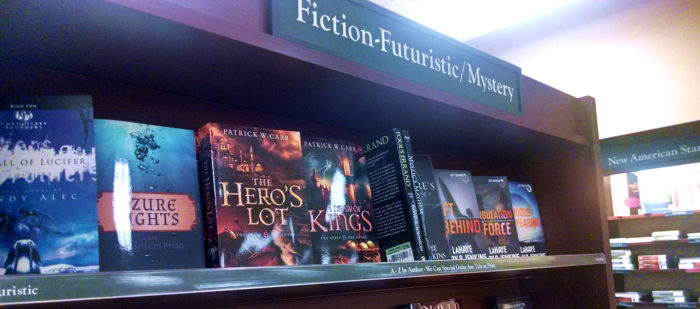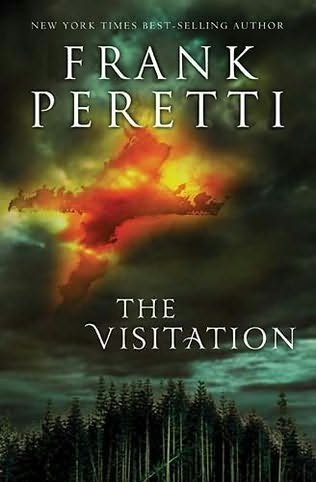Eight Actions To Resurrect Christian Fiction
Christian fiction is dead. Long live Christian fiction?
In the last months I’ve heard rumbles of doom about the fate of inspirational or Christian fiction, e.g. novels from Christian publishers, just keep getting louder.
Agent blogs, such as this one, hint at big industry-wide changes starting this year, as evangelical publishers will apparently reduce their fiction offerings.
 Christian authors, such as Robert Treskillard and Anne Elisabeth Stengl, who had formerly been published through larger evangelical publishers, both announced last month they are pursuing other opportunities. (Stengl said this is because her books have not sold well.)
Christian authors, such as Robert Treskillard and Anne Elisabeth Stengl, who had formerly been published through larger evangelical publishers, both announced last month they are pursuing other opportunities. (Stengl said this is because her books have not sold well.)
What’s causing this shakeup? I’ve read a few theories:
- Christian fiction has a lingering reputation (undeserved) for being uniformly bad.
- Christian bookstores and physical bookstores altogether have a dwindling audience, or perception of such. (One bookstore chain fell into bankruptcy but was rescued in 2015. EDIT: Just one week after this article was originally published, the same retailer, Family Christian Stores, announced Feb. 23 that it would close all of its stores.)
- Younger Christians aren’t shopping at Christian bookstores, or for “Christian” things in general, for various reasons—including the above, and for other lifestyle choices.
For my part, I used to purchase books enthusiastically at Christian bookstores. I stopped when I got older, for the same reasons I prefer streaming services over cable television: I like to go directly to the stories I want, while skipping other stories or ads for other things.
But I’m a fan who believes Christians do need their own fiction. We need distinct companies and labels and systems and everything. Apart from faith-based reasons, Christians are a people group, too. And people groups will inevitably develop their own subcultures, just like any other semi-organized fandom. In fact, if we believe in the Church doing the Great Commission, we must accept that we’ll have some kind of culture by gathering together in local churches to learn the Gospel, fellowship, and help one another practice evangelism.
Others have other reasons for avoiding “Christian fiction.” Let’s talk about those elsewhere.
Here, I want to imagine life after the death of today’s Christian fiction. After all, Christians believe in the ultimate death-and-resurrection Story. We believe this so much we repent of our sins, die to ourselves, and receive new life in Jesus. Sometimes we’re even called “born-again Christians.” So what can we do to help Christian fiction become born again?
I’m speaking partly to the next generation of Christian publishers here. But mostly the fans.

1. Figure out what fiction is even meant to do, starting with Scripture.
Recently a biblical pastor Facebook-ranted against another Christian’s article that, in part, reviewed a popular (yet sexually explicit) TV series. I sympathized with his criticism. But I happened to know this pastor has not publicly considered or taught about what fiction is meant to do in the first place. So arguably he had no standing to say of another Christian, “That’s not how you should engage with a story.” At least the other Christian was trying.
The same is true of Christians who criticize existing Christian fiction using arguments that may sound spiritual or even artistically superior, but aren’t ultimately based on the Bible.
If you sally forth to declare that the best Christian stories must first “reach people better,” or even merely be “artistically excellent,” without appealing to biblical texts about Jesus’s Great Commission (Matthew 28:16-20, the “reach people” part) or God’s earlier Cultural Mandate (Gen. 1:28, the “artistic excellence” part), it’s not very effective!
2. Find fans who have similar biblical conviction and imagination.
 Websites such as Speculative Faith can be awesome. But their outreach is limited, first in focus (we’re about fans of fantastical stories) and then in physicality. We are not members of your local church, or workplace Bible study, or campus group, or circle of live friends.
Websites such as Speculative Faith can be awesome. But their outreach is limited, first in focus (we’re about fans of fantastical stories) and then in physicality. We are not members of your local church, or workplace Bible study, or campus group, or circle of live friends.
So spread out to reality. Start by keeping up with Realm Makers. This five-year-old real, live, working creative conference is currently the leading chance to build an organic and excited Biblical Christian-based community, which will help with the fantastical side of any pending Christian-fiction rebirth. Consider going to the Reno, Nevada conference this July.
Meanwhile, start a church story group. Help remind people who have biblical conviction and who like imaginative stories, “This is okay to enjoy for God’s glory. Let’s do it together.”
3. Stride forth with winsomeness, a confident voice, and ‘swashbuckling.’

Green tights optional.
Sometimes Christian fantasy fans’ articles and remarks can betray uncertainty about our “geekiness” or position in Christianity. That is inevitable in some cases. But as we study these issues, overthrow old unbiblical notions, and find godly friends, it will become easier to grow in confidence even while striving for appropriate biblical humility in these pursuits.
Don’t whine about bad Christian fiction or the death of its genres. Instead, swashbuckle. Doff a feathered cap, retrieve a rapier, and “fight” for this cause while laughing and dancing.
4. Encourage bravery about certain words and topics.
Good Christian fiction can include swear words. There, I said it. If Christians disagree, they are likely either being inconsistent, or ineffective evangelists: inconsistent, because they do not also avoid non-Christian people who voice vulgarities; or ineffective (perhaps even sinfully so) evangelists, because they do avoid these people and therefore cannot show by their actions that Jesus came to preach repentance in an R-rated world, not a G-rated world.
Of course, speech codes are not the only wrong restriction on Christian fiction. Theme codes also do this by limiting the doctrinal span and scope of most novels (more below).
5. However, do nothing for outrage’s own sake—that is the dark side.
There is no surer way to keep other Christians’ bad-words-bans firmly in place, at least in the back of people’s minds, than whining in youthful outrage about the problem.
Many complaints about Christian fiction’s lack of “bad words” are simply immature. They ask the wrong question, Why can’t we do this? instead of challenging the bad-words rules based on the more biblical challenge: According to the Bible, this is why we should do this.

Christian fiction: fall, die, and rise.
6. Budget each month to buy great Christian novels you’ve heard about.
Last year my wife and I budgeted $10 a month solely for book purchases. We still did not buy nearly enough books. But it’s a start. We are building on it this year. And it’s needed so we can resist that ever-creeping assumption that great stories ought to be cheap, easily accessible, or else perennially free as part of an Eternal Kindle E-Book “Promotion.”
Also, read more than you write. Yes, I’m also writing that Great American-Flavor Christian Novel that will “fix” this whole problem straight away. Guess what? Nobody cares. O author, die to self a little bit. Go out and “evangelize” for someone else’s published fantastical story.
7. Don’t ‘ban’ any genres: romance, fantasy, mystery, literary, popular.
In my personality and circles of friends, it’s easy to diss romance and other genres we feel take over fiction and Christian fiction in particular. Let’s not do that. All these stories reflect God-given human creativity. We may prefer fantastical stories, and want to see Christian-made ones grow among readers. But we should want all genres to be improved by any future reboot, or rebirth, of Christian fiction. I myself have heard of a few “literary” novels by Christians that I need to try. Such stories can only help challenge other genres to grow.
8. This is ‘Christian fiction,’ so let’s see more than generic Christianity.
 Finally, for now, I sometimes have to laugh at the label “Christian fiction” because I do not recognize its faith as little more than Elseworld Christianity. In some (not all) novels—and this includes some fantastical novels—Christians are “local color” side characters who assist weak seeker-friendly non-Christian heroes. Or they are members of a single, vaguely megachurch-ey denomination(?) specifically dumbed-down as if to placate members of any other denomination who pick up the novel. Thus, these characters don’t seem real. Because in real life you have denominations, and sometimes Christians even get into fights.
Finally, for now, I sometimes have to laugh at the label “Christian fiction” because I do not recognize its faith as little more than Elseworld Christianity. In some (not all) novels—and this includes some fantastical novels—Christians are “local color” side characters who assist weak seeker-friendly non-Christian heroes. Or they are members of a single, vaguely megachurch-ey denomination(?) specifically dumbed-down as if to placate members of any other denomination who pick up the novel. Thus, these characters don’t seem real. Because in real life you have denominations, and sometimes Christians even get into fights.
This would also solve the narrowed-theme problem. If a Christian novel limps along, afraid to portray any specific flavor of Christianity, it can’t fully explore many potential themes.
Perhaps my all-time favorite popular Christian novel, Frank Peretti’s The Visitation, easily surpassed this issue. Peretti not only showed denominations but specifically made his hero a charismatic Pentecostal. It opened his story to themes such as healing, false messiahs, and the very real challenges of following Jesus in a world drawn to celebrities and “miracles.”
Go ye therefore
Christian publishers can’t resurrect Christian fiction. They’re businesses. If they end imprints, or publish fewer novels, that’s not because they want to. It’s because their audience “wants” them to. So show them differently. Write letters if you need to. Publish comments to their Facebook pages. Know what fiction does. Find others. Swashbuckle. Challenge when appropriate. Don’t be outraged. Buy stories. Of all kinds. And go deeper.
Christians, of all people, ought to love seeing dead things come back to life. So let’s pray and gather and work and anticipate the birth of the next generation of Christian fiction.










































Stephen, thanks for the mention … this is a HUGE topic, that I think will only become more important over time.
To clarify my own reasons for choosing to self-publish the final three volumes in my Merlin/Arthur series:
* Like Anne, my sales were not good enough for Zondervan/HCCP to continue the series. They expect a lot of sales for it to be worth their while, and I accept that. However, keep in mind that my books were pubbed by their (at the time) new imprint, BLINK, which was actually a General Market imprint of Zondervan. This is a good idea of theirs, but I must say that they were still trying to figure out how to market to the general market at the time of my publication … it was an experiment that is still continuing. Their approach was to take as many Christian purchases as they could get, but to market the the ABA, which I think hurt my sales as my books were more written for the CBA.
* Despite this, I still have two Christian publishers interested in my series. My decision to self-publish and not pursue those opportunities resides solely in my realization that I am not, at least during the next three years, able to meet a traditional publisher’s schedule.
* As well, I am intrigued by the ability to control the pricing, cover design, and marketing of the novels, and am really looking forward to broadening my base by dropping the price to free or near free on at least one of my novels.
Great post, Stephen! I agree with you that there is a place for and a need for Christ glorifying fiction, whether written for the Christian market, or for beyond it.
-Robert
Robert, thanks so much for your extra thoughts. I’ve wondered about BLINK and what happened to that concept. It seemed experimental at the time, and I noticed I had not been hearing much about it recently. Does the imprint continue? One would hope so.
And yes, it seems clear that a lot of this is due to the continuing aftershocks of e-publishing and the weakening of traditional media as a whole. Perhaps eventually we will see more competition among digital retailers. That’s their task. I see my task as encouraging the role of fans and/or readers — and reminding myself, in my reading and buying habits, that stories are valuable and we need to stop expecting them to be free. Otherwise, the whole novel/storytelling industry will continue going down the same terrible vortex that has doomed the news media, which all stupidly jumped onto the “news should be free and advertising(!) will pay for everything” nonsense within the last 10-20 years.
As a YA imprint, BLINK seems to be doing well … only with a bit less epic fantasy and a little more focus on romance and contemporary novels.
It’s a bigger problem than just Cheistian publishers. All of publishing is hurting right now. Data Guy’s slides at that last big publishing conference (DBW?) were frankly alarming. Their fates depend on the whims of Amazon discounting. Amazon is poised to break all their backs this year, so hold on to your hat.
Christians have trouble finding their audience–yeah, join the club. Discoverability and marketing is a hot topic among indie authors. Right now the big trend is newsletter promos, or author-swapped promos. Christians could stand to try a few of these techniques. All is not lost. In fact, this is the best time to be an author since the days of pulp.
A couple of concerns of my own to put out for considering, too.
1. Christians books need to be theologically sound.
I don’t mean they need to all defend the 5 points, or what have you. But there does need to be some idea of sound Christian doctrine in them, a knowledge of the basics of Christianity that they don’t stray from.
For example, can a book be considered truly Christian if it portrays a character doing works to earn salvation from God?
Or, maybe to put it another way, the authors need to know more than just some vague God-talk. They need to have some level of solid discipleship.
2. Realism. Yes, even in sci-fi/fantasy/spec stuff.
Does every heroine need to be drop-dead gorgeous? Does every hero need to be ripped? Do they all need to be the top-of-the-line at whatever it is they do, be it marine biology, black-ops spycraft, or baking apple pies? Do they have to be able to do everything perfectly?
And it’s not just a case of giving an otherwise perfect character a fatal flaw, or a scar under his left nostril. To get back to the first point here, it’s about looking at characters, even our non-human characters, as mirroring in some way ourselves–fallen, sinful, and whose “good works” are tainted by sin. Make them as physically perfect as you want them to be, but can you show both the ugly that goes to the bone, and the divine cure for that ugliness?
I wouldn’t disagree with the points you’ve made. Christian fiction needs to get better in these areas. As you said at the beginning of the post, bookstores are going out of business. That’s something that is going to happen. I think if Christian authors want to be successful they need to think from a businessman’s perspective as well. I think that’s largely what is killing bad fiction. If you want to sell bad fiction, you have to market it well.
Obviously the same goes for good Christian fiction. The funny thing about this article (and no offense is meant to be given) is that it doesn’t mention the Christian authors who are being successful by creating Christian books which are excellently written & embracing the opportunities of marketing via the internet, rather than calling the internet a curse which has killed the bookstores.
The bookstores may have been what made getting published hard. Profitability was always the end-goal for all these publishers. The internet has freed us from that.
We’re going to see a lot more crappy fiction, but the good authors (like Andrew Peterson for example) are now liberated to benefit far more from the internet than they ever would have from bookstores.
As a business-focused author (who believes his work is well-made), I can personally attest to the difficulty of getting your work out–even through the internet. Though bookstores can be seen as a barrier (limited physical space makes them choosy), internet retailers are no different in their desire to make a profit, and they promote what sells, not what’s well-written.
The truth is that readers distinguish between books more on the basis of personal preference than what is excellently written, so even in the online space marketing excellent fiction can be as hard as dental work on a chimpanzee–unless you’re a special unicorn author whose book tickles the algorithms in JUST the right way.
Physical distribution makes a huge impact on sales. The decline in bookstores is not good news. Neither is it the apocalypse. But the online “revolution” isn’t great news for all authors who try to utilize it. It offers new opportunities, but not necessarily better opportunities–depending on your audience and the material you create.
Selling books is not easy. Period. If it was, Christian Publishers wouldn’t be closing down their fiction lines. Traditional publishing companies are filled with professionals who understand the space. The biggest problem I see with marketing Christian Fiction lies with its audience, not the savviness of those marketing it. Non-Christians don’t want to buy books that preach to them, and the majority of Christians who read Christian fiction want only books that pander to their cultural viewpoint–which is frequently not what’s in step with a truly biblical worldview.
Case in point, we’ve done marketing for my biblical fiction, and I’ve received comments from conservative old Christian women such as, “This story has already been written. It’s called the Holy Bible.” As if to rebuke my attempt to fictionalize Scripture. As if I have never read Scripture, or else I wouldn’t be trying to “add to it.” Then 1-star reviews calling my work “un-biblical” because the main character doesn’t receive redemption or convert to serving God–even though the Bible itself gives this character a negative fate, and giving him redemption would go against Scripture.
The problem is that the audience doesn’t want well-written fiction. Instead, they want fiction that just makes them feel good. Nothing wrong with that, other than I think they’re missing out.
This right here. Exactly.
Christian audiences don’t yet understand what stories are meant to do, or why we even need them. So they either praise or condemn certain stories without a real cohesive, “nonfiction” worldview to guide them.
[…] market downturns, many authors do well. But for various reasons, some do […]
I think we are making this too difficult…just write GREAT stories. J.M. Barrie…Frank Herbert…L. Frank Baum didn’t need all of this…nothing changed people still love great stories. So much of what I see in Christian fiction is sub-par. Further, I believe Christian publishers need to get off their duffs and start pushing books harder and stop relying on social media to do everything for them. Beyond this there is a huge gap between Christian fiction and scripts to film. Narnia and LOR set the pace where is the contemporaries?
[…] Eight Actions To Resurrect Christian Fiction […]
[…] Eight Actions to Resurrect Christian Fiction […]